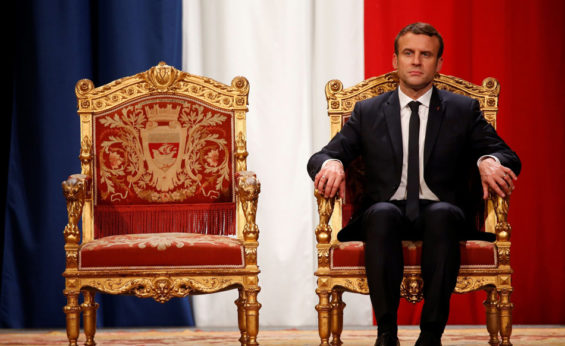
When French President Emmanuel Macron secured his sweeping victory of the Élysée Palace in May and a majority in parliament in June, it was said that only the unions had a chance of checking his power. So this week’s show of unity and strength by public-sector unions—after months of squabbling—will have him worried.
For the first time in a decade, all nine unions representing 5.4 million public workers protested in the streets of France on Tuesday, Oct. 10. At issue are Macron’s plans to axe 120,000 public-sector jobs, reduce sick leave compensation, and freeze public-sector pay.
Workers in health, education, local government, as well as air traffic controllers and train drivers, are among those who went on strike.
French unions were initially divided over Macron’s policies, above all his labor reforms that undermine collective bargaining, cap unfair dismissal severance payments, and reduce the role of unions, thus undermining workplace democracy.
Traditionally the most militant, the CGT federation strongly opposed the changes from the outset, organizing two days of mass protests in September against the attacks on labor rights.
But it found itself isolated initially, making it easier for Macron to ram through legislation by decree on September 22. Now, the base of the two other largest union confederations, the FO and CFDT, are starting to force their leaders to align themselves more closely with the CGT, after they failed to secure any meaningful improvements to the new laws following talks with the government.
With further protests and strikes called for October 19, unions hope some pressure can still be brought to bear on the government as the labor law decrees are confirmed in parliament and other measures are debated by MPs.
It won’t be easy, as Macron’s upstart La Republique en Marche political movement has a big majority of seats. And for certain, the battle won’t be won by force of argument, for evidence and facts are not deciding Macron’s policies.
Unions are at pains to point out the holes in Macron’s claims that his labour reforms are driven by the desire to cut unemployment from its current 9.5 per cent to 7 per cent in five years, boost sluggish growth, and will be welcomed by employers.
A study by national statistics agency Insee conducted among businesses earlier this year found “economic uncertainty” and “lack of qualified/skilled labor” were the two top reasons for not hiring, with costs and regulations trailing in third and fourth place.
The biggest determinant of France’s economic health is the austerity drive and behind that is Europe, a matter that Macron can do little about.
As with most other member states bar Germany, the euro currency is overvalued, making French exports expensive, and the draconian monetary and budgetary strictures have stifled growth and investment.
Macron has made great play of a new Franco-German relationship; one of his proposals is a eurozone budget of hundreds of billions of euros to be used to underwrite investment projects and raise spending in countries with high unemployment. But this is fanciful.
There was never much prospect of convincing Germany to back such a plan, and now Chancellor Angela Merkel, weakened and facing the Eurosceptic and neo-Nazi Alternative for Germany (AfD) party in parliament, is even more likely to stick to her formula of destructive deficit reduction and pro-market structural reform.
The question remains: How do the structural reforms Macron is championing at home help produce the skilled, productive workers French employers are seeking?

Even the IMF is skeptical about that one, as was confirmed in a study it published in 2015. Instead, as can be seen elsewhere in Europe where flexible labor market polices have been tried over the past decade or more, it simply leads to millions of precarious jobs on low wages.
So yes, he may cut unemployment, but at what cost? In seven of the 28 E.U. countries, real wages have fallen in the past eight years, while wage growth has slowed in 18 of the members and risen in just three—Poland, Bulgaria, and Germany, according to research published earlier this year by union think tank, ETUI. Inequality of wealth and income have widened too.
In France, already the pro-market austerity policies pursued by the former Socialist administration of François Hollande have seen the loss of thousands of skilled, relatively well-paid jobs in industry. In the public sector, some grades of workers have lost 20 per cent of their purchasing power while many are now earning rates lower than the minimum wage, according to the FSU trade union.
But if Macron gets his way, what former president Hollande stole from working people will look like a very modest mugging. On top of the attack on the public sector and labor rights, Macron is planning reductions in welfare, including housing benefits.
Meanwhile, he’s reducing corporate taxes and scrapping a levy on wealth. A former Rothschild banker, Macron’s program was best summed up by the recent headline of liberal newspaper Libération: “President of the rich?”
The backlash against a supremely arrogant president began within three months of his election, with his personal ratings falling faster and further than any previous sitting resident of the Élysée Palace.
New opinion polls confirm opposition is spreading to his policies.
According to Harris Interactive, 65 percent indicate they are opposed to his labor reforms, and that includes 29 percent of Macron voters. 71 percent are unconvinced the reforms will cut unemployment, and 63 per cent say they will worsen working conditions. A separate survey by Elable found 54 percent “do not trust the head of state to fix the country’s social and economic problems,” and 27 percent of those questioned don’t trust him at all.
This week’s show of union unity in action is good news—and hastens the day when Macron, who has compared himself to the Roman god Jupiter and dismissed opponents as “nothings,” comes crashing down to Earth.
This article originally appeared in Morning Star.










